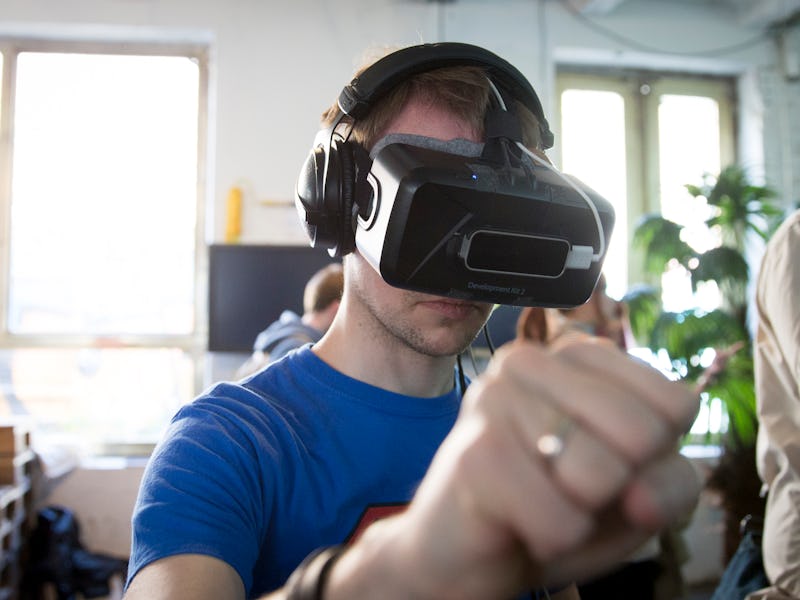By Seizing Rock Band, Oculus Rift Started a Virtual Reality War
In which an industry that prided itself on peace starts stockpiling.

The virtual reality market is in a weird place. Under the heavily-branded stalls are the plasticine remnants of virtual reality’s initial failure, a consumer roll out in the mid-‘90s that led to an immediate roll back. Those early pods were expensive, poorly designed, and, most critically, disappointing. For the VR industry, that’s the ghost of Christmas past, a memory of capitalism failing futurism and a reminder of what not to do.
This time around, though, the screens are better, the nausea less noticeable, and the investments — like Facebook’s $2 billion bet on Oculus Rift — massive. But, perhaps more importantly, there is a sense of collective responsibility that has largely kept Samsung, Google, and Facebook from undercutting each other. Well, had. The Pax Virtualis ended on December 3, when Oculus announced the VR Rock Band would be made exclusive for its platform.
It’s not the console wars just yet, but sounds a lot like that shot in Sarajevo.
Until then, the intra-company warmness had looked something like this:
- Google has partnered with Verizon to mass distribute the Cardboard headsets.
- Samsung partnered with Oculus to create the Gear VR.
- Oculus worked with PlayStation almost constantly.
Partnering and chatting isn’t unusual in any industry, but the sense of bonhomie and foxholeness was absolutely singular. And that chumminess manifested oddly: Industry leaders embraced a Google-New York Times 360-video collaboration that passed itself off as virtual reality with almost passive aggressive good humor. In December, when I visited a VR peripheral developer and noticed that a hard-to-get PlayStation VR headset and an Oculus Rift DK2 were sitting together, the developer remarked that this was emblematic of the industry’s united front.
Was being the operative word.
For those of you blissfully unaware of the concept of Console Wars, every generation of video game player has their own. In the early ‘90s, the 16-bit generation saw the Nintendo v. Sega saga play out in TV rooms and playgrounds. The most recent war pitted the Wii U, the PlayStation 4, and the Xbox One against one another. Competition for games and market share can be fierce as advertising firms and programmers bear down.
The good thing about a capitalist war is that the bystander, the consumer, should win. Console War witnesses, including GameStop CEOs and Huffington Post oracles, believe this to be true. Video game consoles compete to have better exclusive games, better animation, better controls, more games, and, now, the oft-elusive backwards-capability. Given a limited amount of bucks to spend on fun, the consumer benefits.
The obvious caveat here is that this is true only up to the point at which an industry is shaken to its financial core.
Will that happen to VR? Will it get ugly? The answer is likely yes. “Rock Band” was a massive win for Oculus and not one its competitors can afford to take lying down. That said, it’s worth noting that “Rock Band” is a big name because of its unusual gameplay which is well suited to VR but not built for it. This isn’t “Mario.” We don’t know what that game is yet, which is why neuroses will likely drive this fight for the foreseeable future.
And it’s not just about hardware. As battle lines are drawn and Oculus and Playstation leave their shared sandbox in a huff, it may become difficult for developers to create cross-platform games and sell them through Google Play, the Apple Store, or any other forum. In this war metaphor, developers aren’t combatants so much as they are occupied cities. Until the dust settles, expect a lot of exclusives.
And expect to be treated well. After all, the spoils are in your wallet.